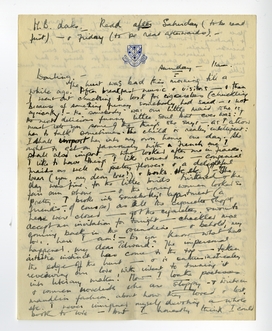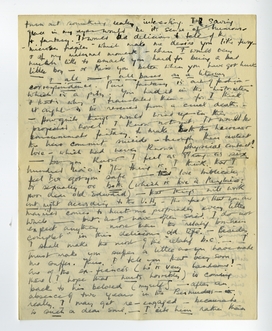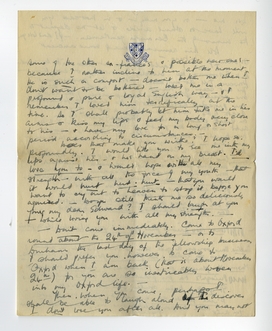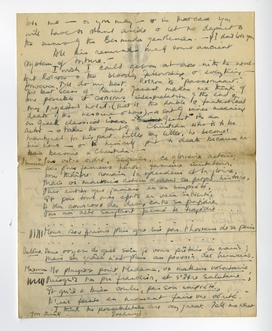Evelyn Blackett
aan
E. du Perron
Oxford, 27 oktober 1929
N.B. dates. - Read after Saturday (to be read first) - & Friday (to be read afterwards). -
Sunday - 11am.
Darling, -
The hurt was bad this morning till a while ago. After breakfast - music & visions - & then I went out chuckling to look for cigarettes (chuckling because of something funny somebody had said - & not cynically! - the ‘somebody’ was our little maid who is the most deliciously funny little soul that ever was: I must tell you some of the things she says - as I allow her to talk sometimes. The child is intelligent: I shall import her into my own home one day. She ought to get on famously with a French one I shall also import - who looked after me in France. I like to have things I like round me - congenial maids as well as pretty flowers & a delightful lover (you, my dear love!) & books, etc., etc.) - The day was fine, for the little birds twittered & the fair sun shone - & the young woman looked so pretty. I broke into somebody's apartment (a friend's of course) as all the cigarette shops here were closed - got the cigarettes, swore to accept an invitation for tonight - chuckled more coming back in the sunshine - & behold, my love, here I am! - Do you know what has happened, my dear Edward? The impersonal artistic instinct has come to the top - taken the edge off the hurt - & is enthusiastically reviewing our love with intent to turning it into literary matter! Now I loathe poetesses & women novelists who are sloppy - & write in maudlin fashion, about how they loved & lost, etc. I never imagined myself devoting a whole book to love - but I honestly think I could turn out something really interesting. Its saving grace in my eyes would be its sense of humour - & fantasy. It would be delicious to tell of the ‘microbes fragiles’ which make me desire you like fury - & of my maternal moments - when I would very much like to smack you hard for being a bad little boy - or kiss you better when you have got hurt - & all - & all based on a literary correspondence. Pure fantasy is out of fashion - which is a pity. You had it in the ‘historiettes’ & that's why I translated them - for I think it ought to be rescued from a cruel death.
- How quite things would wind up in this projected novel, I know not yet. It would be consummate fantasy to make both the heroine & the hero commit suicide - through their ardent love - which had never known physical contact!
- Do you know I feel as strong as six hundred lions! The thing is, I think, that I feel I've got you safe - that love biblically or sexually or both (which is love à l'anglais: poor dear old Edward) - that things will work out right according to the U.H. - The fact that you are married comes to hurt me profoundly every little while - but, as I have often said, I do not expect anything more than the ‘relatif bonheur complet’ in this delicious old life. - Besides, I shall make the most of the ‘relatif boheem complet’ in this delicious dd life. - Besides I shall make the most of the ‘relatif b.c.’ - I must make you suffer a little as you have made me suffer. Thus, I tell you that very soon one of the ex-fiancés (he is very handsome! - there, I hope that hurts horribly) is coming back to his beloved (myself) - after an absence of two years in the Bermudas - &, really, I may get re-engaged - because he is such a dear soul, - I cite him rather than some of the other ex-fiancés & possible new ones - because I rather incline to him at the moment. He is such a comfort - doesn't bother me when I don't want to be bothered - loves me in a profound & pure & loyal English way - & I remember I loved him terrifically at the time. So I shall probably let him take me in his arms & kiss my lips & feel my body very close to his - & have my love for a long or short period according to circumstances. -
Does that make you writhe? I hope so, profoundly. I would like you to see me with my lips against his - & his hand on my breast. I'd love you to - & would hope with all my strength - with all the force of my youth - that it would hurt, hurt, hurt - that you would want to cry out to heaven to stop it before you agonised. - Do you still think me so deliciously young my dear Edward? I should laugh at you - while loving you with all my strength. -
- Don't come immediately. Come to Oxford round about the 24th of November - or to Durham the last day of the Fellowship business. I should prefer you, however, to come to Oxford when I am back (that is about November 24th) for you are so inextricably woven into my Oxford life. -
Then, when you come, perhaps I shall be able to laugh aloud if I discover I don't love you after all. And you may not love me - or you may - & in that case you will have to stand aside & let me depart to the arms of the Bermuda gentleman, - if I don't love you.
All this reminds me of some ancient system of torture. -
I wish I could get on at once with the novel - but Rotrou & the bloody Fellowship & everything - However, I'll do my best. Rotrou is ‘passionant’. The last scene of Saint Genest makes me think of one possible & serious interpretation of the end of my projected novel, (that is the double & fantastical death of the heroine & hero) - a sort of inner meaning on Greek classical lines. - ‘Saint Genest’ is an actor - & takes the part of a Christian who is to be martyred for his past. Little by little, he becomes his hero - & is himself put to death because he has become a Christian. -
I think the possibilities are very great. Tell me what you think.
Eveline.
Origineel: Den Haag, Letterkundig Museum
 vorige
vorige 





